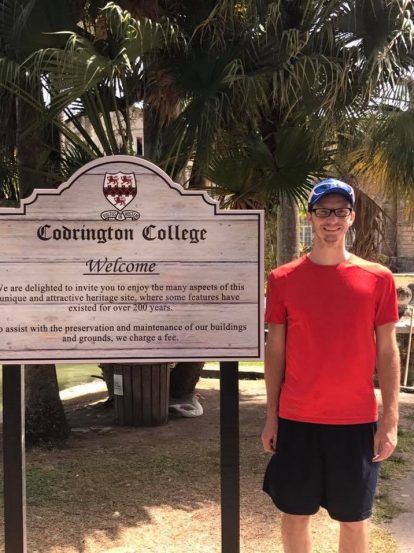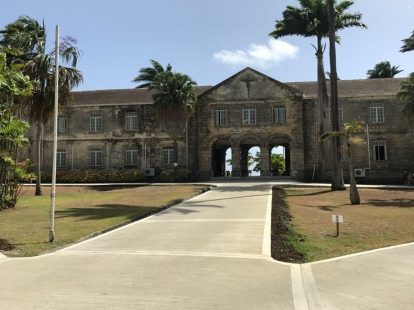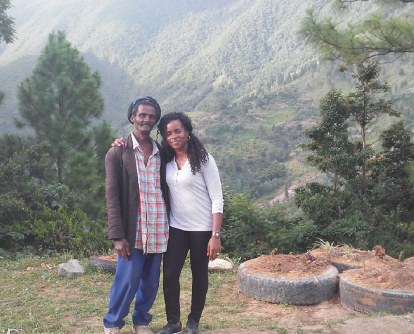There is a wealth of knowledge to be gleaned by studying Caribbean communities past and present.
Two emerging scholars at the University of Florida know this well.
With support from the Center for the Humanities and the Public Sphere’s Tedder Doctoral Fellowships Matthew Strickland learned how religion and slavery were intertwined in 19th-century Barbados and Tameka Samuels-Jones grasped how trust, religion, and access to information all mediate how people decide to obey environmental law in complex ways with a case-study in Jamaica.
Strickland and Samuels-Jones shared their research on 26 September 2018 at the Center for the Humanities and the Public Sphere as part its UF Synergies series.
The UF Synergies series features informal talks by the Center for the Humanities and the Public Sphere’s Rothman Faculty Summer Fellows, Tedder Doctoral Fellows, and Rothman Doctoral Fellows.

For his part, Strickland shared his research on the lives of enslaved people on Codrington Plantation on Barbados and the role of religious conversion that occurred there from 1710 to emancipation in 1838.
Focusing on the Codrington Estates and visiting the plantation and the College archives on Barbados allowed him to study Anglican sermons in this time period, as well as letters, financial records, published tracts, parish records, and laws. He also traveled to the National Archives in London, including the archive for the Church of England, and records of the Codrington Estates at the Bodlein Library at Oxford.
From these sources Strickland found that Anglican clergy created a missionary theology that supported slavery and theories about the inferiority of black people. Religion was seen as a civilizing force and violence against enslaved persons was seen as justified to combat their ‘heathenish’ ways.
However, there was resistance to Anglican missionary work. First, enslaved persons resisted as they held to their previous practices and beliefs. Second, slaveowners who were concerned about religion leading to uprisings also resisted at first. In the end the Anglican church argued that Christianity made enslaved persons more docile and slaveowners eventually stopped resisting Anglican mission work among enslaved persons.

Overall, Strickland argued that the Anglican clergy used religion as a means to justify, and undergird, the pursuit of imperial wealth. The impact of this approach still lingers.
While enslaved persons were released in May 1838, the religious components of the “civilizing movement” in the British empire in the Caribbean created a framework for racial inequality under which black people continue to suffer today.
Moving beyond the plantation, Tameka Samuels-Jones addressed questions about conflicting state regulations and indigenous cultural beliefs in the Blue and John Crow Mountains of Jamaica in her talk.
Designated a UNESCO World Heritage Site in 2015 the site is still threatened by illegal deforestation, water pollution, and poaching. Focusing on three groups — the maroons, Rastafarians, and local coffee farmers — Samuels-Jones’ work provided insight into the cultural and legal factors that determine how to govern natural resources successfully.
Specifically, her dissertation research examines how beliefs and cultural identities impact peoples’ compliance with state environmental regulations, and how non-compliance is managed.

With funds from her fellowship, Samuels-Jones traveled to the Blue and John Crow Mountains where there is ongoing environmental degradation from river contamination, deforestation, soil erosion, and solid waste dumping. She spent time with communities around Moore Town (a maroon community descended from escaped enslaved persons) and went on patrol with park rangers in Blue Mountains to get their perspective on groups engaged in environmentally damaging behavior. She also conducted document analysis to examine legislative documents and enforcement data.
She found that managing the area’s environmental health involved complex negotiations and combinations of state and NGO-co-management with individual local communities and their own socio-political and religious systems.
Each group — the maroons, the Rastafarians, and the local farmers — all had their own political systems and engaged in different kinds of environmentally threatening behavior: maroons hunted protected coneys and were concerned about river poisoning, Rastafarians were concerned about habitat loss and encroachment, and local farmers used pesticides and slash/burn clearing. Furthermore, different religious laws produced varying perspectives on what kind of behavior is acceptable — or not — from an environmental point of view.
Each community harbored a robust distrust of state and believed they could better manage natural resources themselves. They also distrusted Christianity as a source of disenfranchisement and a means of disengagement from temporal, environmental concerns.
Samuels-Jones shared, “Trust, religion, and access to information all mediate how people decide to obey environmental law in complex ways.” She said, “as a result, each group may need a different incentive in order to obey environmental laws.”
For example, Rastafarians want dedicated land rights to a specific area. Farmers might want some subsidization. Maroons may respond to financial assistance or development for maroon community museums.
Above all, Samuels-Jones advocated for a cultural sociological approach to environmental criminology/policy to help authorities understand the role of dialogue and stakeholder engagement in policy-making and to avoid situations of non-compliance by considering the cultural dynamics and belief systems of the various constituencies they have to work with.
Both Strickland and Samuels-Jones benefited greatly from the funds provided for them through their respective fellowships.
In addition, their research proves a valuable addition to the already existing knowledge about Caribbean communities that impact the ways we view society, religion, knowledge, law, and the environment.
The Center for the Humanities and the Public Sphere (CHPS) is thankful for both of their presentations and the conversations across disciplines they helped inspire.
The next UF Synergies event will be “Ethics and Education in the Age of Accountability” with Jaime Ahlberg (Education) and Elizabeth Currin (Philosophy) on October 24 from 4:00 pm – 5:00 pm in Keene-Flint 05.